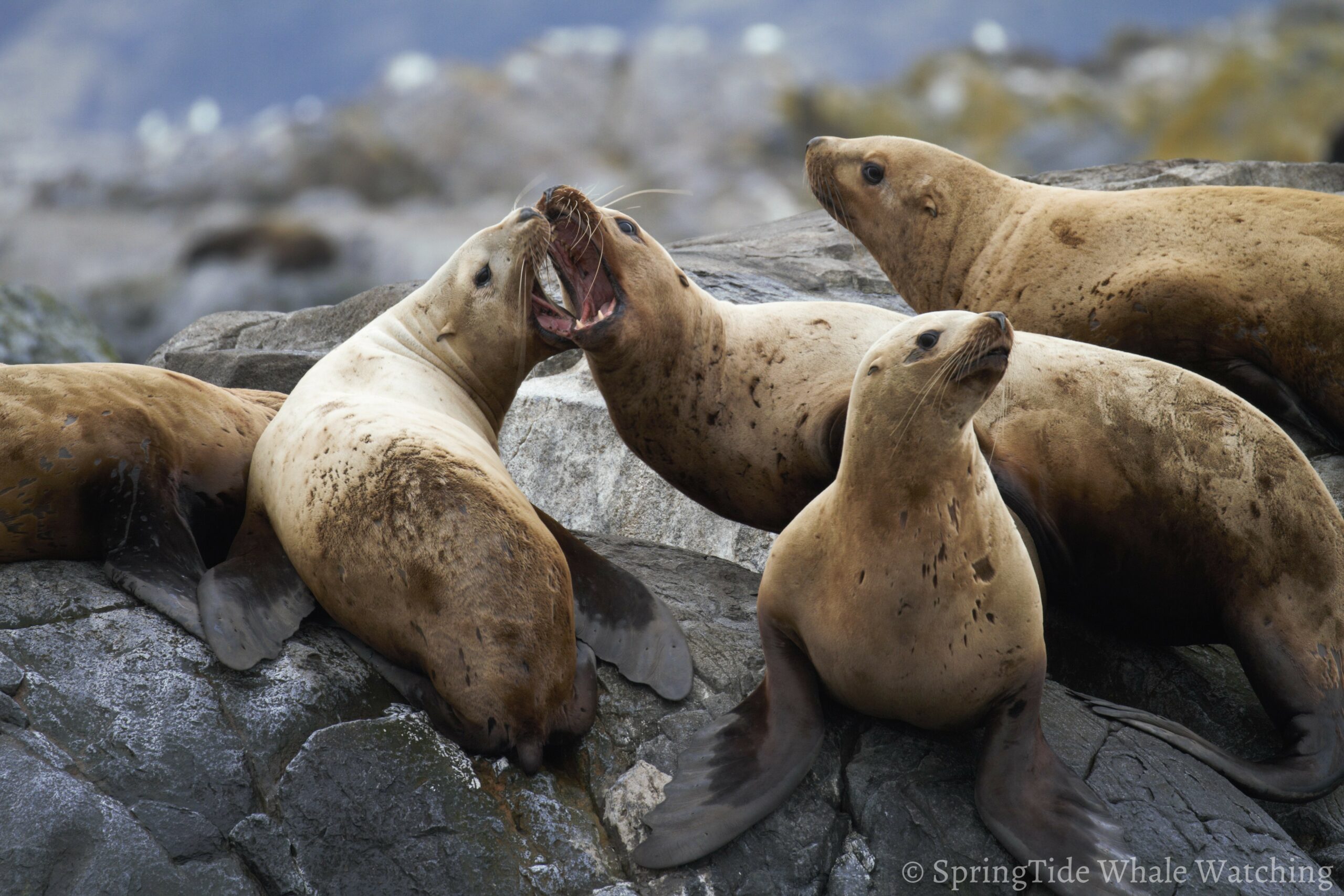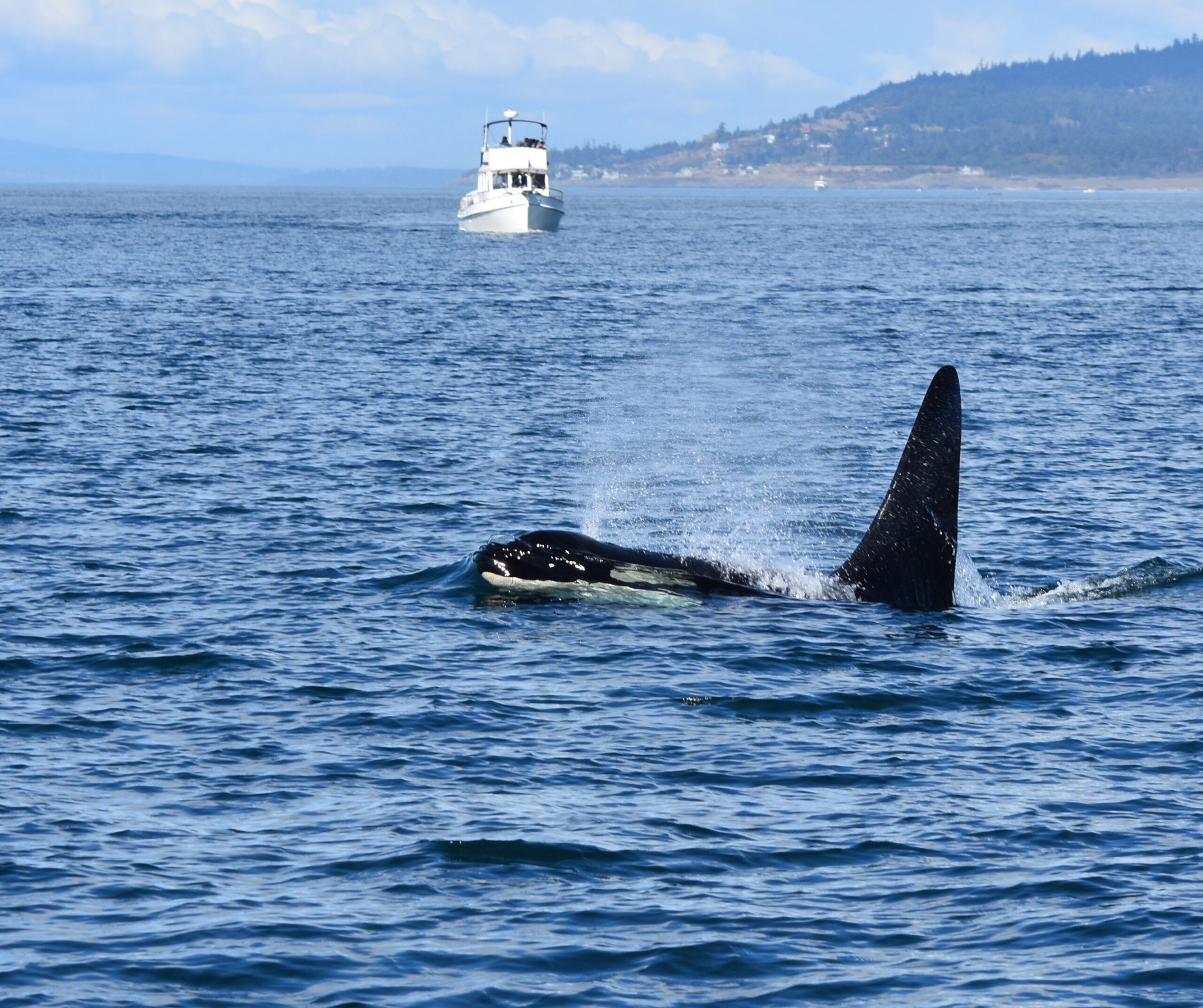THREATS TO MARINE MAMMALS
It’s hard to imagine that whales in the Salish Sea would worry about much in their day to day lives. Orcas are the apex predators of the ocean and therefore don’t have to worry about a larger whale coming for them. A full-grown humpback is almost never on the menu, far too big to worry about getting attacked. It’s easy to think that these animals only have to worry about lounging in the water, and where to find their next meal.
This is unfortunately not the case. Human impact across the Salish Sea is vast, and sadly doesn’t show any signs of stopping. The number of vessels in these waters are in the tens of thousands, and they are only predicted to increase in the coming years. With each vessel there are inherent risks to marine mammals, namely in the form of collisions, and sound.
Marine mammals are tied to two locations. They must dive in the ocean to find their food but are required to come to the surface to breathe. This natural cycle of diving and surfacing puts them in particular risk of collisions with boats. It can be hard for ships to keep track of these animals, particularly when travelling at higher speeds. A collision with a vessel can be absolutely devastating to a whale. A strike with the hull can cause serious internal and external injury, and a fast spinning propeller acts like a blade, cutting through even the toughest layers of skin. Whales aren’t the only animals at risk of collisions. Other marine mammals like seals and sea lions are known to sport scars from run-ins with vessels, showing the danger of interaction with boats.
 Even if marine mammals are lucky enough to miss getting hit by a boat, the ever-present noise of marine traffic also has a negative effect on many species. Whales spend their lives in an auditory world—sound travels much further through water than on land and many animals rely on their hearing to communicate with each other, find food, and orient themselves in their environment. Sound is often more important than sight to these animals, particularly in the dark depths of the ocean. With excess noise from large and fast-moving vessels it can make it hard for whales to do all of these behaviours, and can even cause irreparable damage to their inner ears. Whales with hearing loss are less likely to be well fed and are also more likely to accidentally beach themselves as they may become confused with their surroundings. In a busy area like the Salish Sea, whales are at risk of not only colliding with vessels, but also potentially permanently damaging their ears.
Even if marine mammals are lucky enough to miss getting hit by a boat, the ever-present noise of marine traffic also has a negative effect on many species. Whales spend their lives in an auditory world—sound travels much further through water than on land and many animals rely on their hearing to communicate with each other, find food, and orient themselves in their environment. Sound is often more important than sight to these animals, particularly in the dark depths of the ocean. With excess noise from large and fast-moving vessels it can make it hard for whales to do all of these behaviours, and can even cause irreparable damage to their inner ears. Whales with hearing loss are less likely to be well fed and are also more likely to accidentally beach themselves as they may become confused with their surroundings. In a busy area like the Salish Sea, whales are at risk of not only colliding with vessels, but also potentially permanently damaging their ears.
CONSERVATION MEASURES
With so much traffic in our waters, it sounds like marine mammals are in terrible risk of danger. The good news is that governments and industries across the Salish Sea are all taking steps towards protecting these animals. All whale watching companies for instance abide by regulations made by the Canadian and American governments to limit our speed and approach distances when close to whales. We make sure never to approach within 100 m for humpbacks or 200 m for orcas. To further dampen our sound, we also put extra mufflers in our boats, limiting the noise that is transferred to the water. In addition we are working on a system as a part of the Pacific Whale Watching Association to provide the data we collect to whale sightings networks. As a part of PWWA, one of our main goals is to help reduce high speed encounters with all marine mammals.
There are many more initiatives across BC that are attempting to mitigate the risk of vessel collisions and noise. The Port of Vancouver, along with researchers at Simon Fraser University, did a 61-day vessel-slowdown trial to study the affects of marine traffic in key habitats for BC’s whales. Using data collected from this study, researchers were able to determine the benefits for these types of slowdowns, and hopefully provide evidence for implementing them across BC. Ocean Wise is in the process of implementing the WhaleReport Alert System, a way for commercial vessels to report sightings of marine mammals in the Salish Sea to help each other change course or slow down while in the presence of whales.
With all these initiatives, we hope that important steps will be made to help protect marine mammals in the Salish Sea. With any luck, we will be able to reduce our impact on these animals and learn to share this environment that is so important to both humans and whales.
Blog written by our Naturalist Aaron.

